- Home
- David Downing
One Man's Flag Page 2
One Man's Flag Read online
Page 2
A lever, as one man put it. An inducement.
Now that he’d met Rehmer, McColl found himself almost hoping that the German would treat his offer with the contempt it probably deserved. Which wasn’t very patriotic of McColl, but the older he got, the less patriotic he felt. Growing up among people who wouldn’t trust an Englishman any further than they could throw him, having a front-row seat at the establishment cock-up popularly known as the Boer War, and actually experiencing a whole host of other cultures—all of which suffered the same delusion that theirs was the best—would have put a dent in anyone’s ability to swallow the risible notion of one’s country right or wrong. Meeting Caitlin Hanley had just been the cherry on the cake.
McColl didn’t believe that people like the Rehmers should ever have been interned in the first place—deportation would have served the same purpose and been much less vindictive.
Some people claimed that war brought out the best in people. And maybe it did—it sure as hell brought out the worst.
McColl walked back down the hill and stopped off at the club to write a couple of letters. He filled the one to his brother with jokes, the one to his mother with vignettes of life in India. After dropping them off at the post office, he walked back to his hotel for another hour with The Ragged-Trousered Philanthropists. It wasn’t a book to cheer one up, but it was certainly hard to put down.
Next day the sky remained overcast, Kangchenjunga and the other peaks hidden from view. After breakfast McColl walked north up the ridge, passing St. Andrew’s Church and a dead-looking Government House, eventually reaching a native village, where one of the inhabitants asked with some concern whether the sahib was lost. Back in Darjeeling he had drinks and lunch at the club, where a rumor was going the rounds that two Germans had escaped from the Katapahar camp. No one thought they’d get far, and McColl wasn’t worried that Rehmer would be one of them—he didn’t seem like the sort of man who would ever abandon his wife. He ordered another whiskey and listened to the old hands at the next table tell a recently appointed plantation manager that he’d arrived too late to experience the real India. How the Indian waiters kept a straight face was anyone’s guess.
McColl had hoped the sky would clear so he could take in the famous view from Tiger Hill, but nature refused to cooperate, and he settled instead for a walk to a nearby Tibetan temple. The going was mostly downhill on the way, and soon after passing a white stupa with a low dome and golden spire he saw the temple in the distance, amid a forest of poles bearing brightly colored prayer flags. The forecourt contained several prayer wheels. After leaving some money, he gave one a spin and offered up a half-serious prayer that Caitlin Hanley would forgive him. Some hope.
The trek uphill was much more demanding, and by the time McColl reached Auckland Road, he was seriously out of breath. Remembering the rumored escape, he stopped in at Gilzean’s office to find out if one had actually occurred. It had. Two young men—boys, really, as neither was yet sixteen—had left the camp early the previous night without telling their parents. According to friends, they intended to walk to China and then somehow find their way back home to Germany, where of course they planned to enlist. Gilzean was unsympathetic, but to McColl they were just another pair of victims, in thrall to the general madness. Later that evening, gazing out his hotel window at the rapidly darkening hills, he wondered whether the two boys had begun to regret their patriotic impulse.
If they had, it hadn’t been for long. McColl’s arrival at the police bungalow on the following morning coincided with that of a cart containing two young bodies. One blond boy had two exit wounds in his chest; the other had half his head blown away. Both looked younger than their fifteen years.
The soldiers escorting the cart seemed in an ebullient mood; one or more of their Lee-Enfield MkIIIs had no doubt done the damage. Shot trying to escape, as the saying went.
Gilzean had the decency to look embarrassed, but no one was going to kick up a fuss about a couple of dead Germans, not after Belgium.
McColl had his own concern: “Do the other Germans in the camp know what’s happened?”
“They soon will—the army sent someone down to warn the camp commander.”
McColl sighed. “Well, there goes any chance of getting Rehmer to talk.”
Gilzean shrugged. “Maybe he’ll realize we mean business.”
McColl gave him a look but didn’t try to argue. He took the ride back up to Katapahar with Salil and faced Jürgen Rehmer across Marshall’s desk for the second time. The German was coldly contemptuous. “The answer is no.”
“And your wife is happy with that?” McColl asked, hiding his own self-disgust.
Rehmer’s look was pitying. “I would have given you what you asked,” he told McColl. “It is she who insists I say no.”
After the guard had taken the German away, McColl sat there for several minutes staring out through the open doorway at the limply hanging Union Jack and fog-shrouded trees beyond. He told himself what Rehmer had told him at their previous meeting, that he was simply following orders. It didn’t help.
The sky refused to clear, either that afternoon or overnight, and mist still clung to the rooftops when McColl left Darjeeling on the following morning. He could still visualize Kangchenjunga and the other peaks in all their awesome splendor, but he knew that the image that would truly stick in his mind was the one of the two slaughtered boys in the cart.
When they reached Tindharia, the train from Siliguri had already arrived, and several tables in the restaurant room were occupied by British families intent on escaping the imminent prospect of Calcutta’s stifling spring and summer. It was allegedly well worth escaping. McColl’s only previous experience of real heat had been his summer in South Africa, and according to those who had suffered through both, the Bengali version was several times worse.
Thinking about South Africa as his train continued its descent, he remembered that Gandhi had arrived back in India a few months earlier. The now-famous Indian had been one of the stretcher bearers who had carried McColl down from Spion Kop, and McColl had followed Gandhi’s political career ever since. It would be good to see him again, he thought, if only to ask the Indian why he had pledged his support to the British war effort. After what Caitlin had told him about Gandhi’s pacifist ideals, it had seemed a surprising position for the Indian to take, but one that McColl had found vaguely comforting. There was no shortage of knaves and fools who supported the war, and having someone of Gandhi’s humanity and intelligence defending its necessity made McColl feel a little better about his own reluctant belief that it had to be fought and won. He would love the chance to discuss it with him. Gandhi was in Ahmedabad, on the other side of the country, but maybe their paths would cross again.
The wait at Siliguri seemed endless, but the Mail left on time at 8:00 p.m. His private berth in the first-class coach was spotless, and once the attendant had been convinced that all he needed was sleep, McColl was left alone with the rhythm of the wheels until they reached Santahar, where a change of gauge meant a change of train. He was awakened again by the drumming of the wheels on the new Hardinge Bridge across the Ganges. Opening his window to a warm, caressing breeze, he saw the almost-full moon hanging above the vast river, the smoke from their engine smudging the first light of morning.
By the time they reached the next stop, it was light enough to read by the window, and after buying a clay pot of tea from one of the platform sellers, he reached for Tressell’s book. Before going to sleep, he had read the chapter called “The Great Money Trick,” in which the hero, Owen, during a work break, explains the essence of the capitalist system to his fellow workers. It was cleverly written, and try as he did, McColl could find no flaw in Tressell’s logic. The system did seem like a giant sleight of hand.
Why was he reading a socialist tract? To know the enemy, as he’d jokingly told his Section Five counterpart Alex Cunningham? To pr
ove how open-minded he was to friends like Cynthia? Neither, in truth. It wasn’t the first such book he’d read over the last six months, and he knew the reason all too well—Caitlin Hanley. The woman he’d loved and deceived and whose rebel Irish brother he’d caught, imprisoned, and effectively sentenced to death. Colm Hanley was still in Brixton Prison as far as McColl knew, awaiting execution.
McColl’s relationship with Caitlin had opened his eyes to a lot of inconvenient truths, particularly when it came to serving the British Empire. And eyes once opened were hard to close—he might not have seen her for over seven months, but he still saw the world, at least in part, through her ideals and explanations. Which both pleased and annoyed him. It was a way of keeping her in his life, but the continuing censure of someone who never wanted to see him again was sometimes hard to live with. Caitlin would find Tressell’s critique self-evident and find fault only with the minor roles he gave to women.
McColl put the book down, wondering where she was now, what she was doing.
The train chugged on southward across flat delta country for the last hundred miles, stopping just twice before it slowed to a crawl for the final approach to Calcutta’s Sealdah station. After arranging for the delivery of his luggage, McColl worked his way out through the teeming crowd to the tonga stand and climbed aboard the first in line. “Great Eastern,” he told the driver, who wasted no time in whipping his pony into motion.
They cantered westward down Bow Bazaar. It was only nine in the morning, but noticeably hotter than it had been five days before, and by the time the tonga reached the corner of Dalhousie Square and turned down Old Court House Street, McColl could feel the sweat gathering on his forehead. The British bobby outside the hotel looked hotter still in his uniform, and the electric fans in the Great Eastern’s lobby were already working overtime. Once ensconced in his room, McColl flicked the switch and stood for a while beneath his own whirring blades, reassessing his earlier thought that a cheaper hotel might be more discreet. He took a bath to wash off the journey and was drying himself when his luggage arrived from the station. The room boy who came with the porters had a cable from Cumming in London. Reading it, McColl learned that he had been formally seconded to the Calcutta DCI with instructions to uncover and thwart any German plans to arm the Bengali terrorists. Encrypted reports from Singapore, Batavia, and Bangkok would follow.
Almost as an afterthought, Cumming noted that Colm Hanley’s execution had been fixed for March 30. Reaching for The Statesman he’d picked up the station, McColl discovered that today was the twenty-ninth.
It was a moment he’d dreaded. If there was no last-minute reprieve, if Colm Hanley died in the same shooting-range shed at the Tower of London as his erstwhile republican comrades, then Caitlin would never forgive him.
McColl grimaced. Who did he think he was kidding? A reprieve, a pardon, neither would make any difference to her. A change of heart from Caitlin was as likely as snow in Calcutta.
One of Ours
It was an early spring day in London, warm and sunny, with fluffy white clouds scudding across a pale blue sky. Such weather was supposed to lift the heart, but Caitlin Hanley felt only the faintest of cruel stirrings as she walked down Jebb Avenue toward the Brixton Prison gates. This was the last visit—by this time tomorrow the brother she had helped to raise would be in the ground.
Her step faltered at the thought, but she had to be strong. With the rest of the family three thousand miles away, she was all he had.
Spring hadn’t reached inside the prison. The whitewashed walls, the cold faces, the mingled smells of disinfectant, smoke, and urine—all were familiar from seven months’ worth of visits. The only change was in Colm’s clothing—the prison uniform was gone, and for one mad moment she thought he was going to be released. But then she realized: Brixton had reclaimed its property prior to sending him off to the Tower.
The mesh screen precluded hugs, but once sat down they could grip each other’s hands through the semicircular hatch. A stranger might have thought Colm in high spirits for someone with less than a day to live, but she could see the hint of panic in his eyes and hear the slight hysterical edge to his voice.
“So what’s new in the world outside?” he asked, as if determined to keep things normal.
She told him. If he wanted the latest bulletins from Europe, the latest news from Ireland and home, then what was she to say—that their last thirty minutes together would be better spent in angry laments and floods of tears?
“I’ve had letters from everyone,” he said after she’d passed on some family news.
“From Dad?”
“Even Dad. He tried, I can see that now. But he doesn’t understand that times have changed.”
“No,” she agreed. “And the others . . .”
“Well, what can they say? ‘We’re thinking of you. We’re sorry to lose you.’” He made a face. “Let’s not talk about it. I knew I was leaving them behind when I got into this. One way or another.”
She shook her head. You don’t ever leave your family behind, she thought—you just close your ears to their voices inside your head.
“I don’t expect them to understand,” he was saying. “But you do, don’t you?” It was almost a plea. “We’ve always been the fighters, you and me.”
“I do,” she said. It might be only partly true, but it was what he wanted to hear, and her not agreeing with how he had chosen to fight no longer seemed to matter.
“Remember that time we stole Mr. Peterson’s dog?” he asked. “Everyone knew he beat the hell of the poor mutt, but we were the ones who did something about it.”
She remembered, all right. The look on Aunt Orla’s face when the police showed up at their door.
“Ten minutes,” a voice intoned from the doorway behind him, shocking them both.
She couldn’t believe that this was the last time she would see him. “I don’t know what to say,” she blurted out. “I’ve never felt so helpless in my life.” She looked around the room as if it might provide an answer. “I know there’s nothing I can do, but I can’t seem to believe it.”
He squeezed her hand. “But there is,” he told her. “Two things.”
“Tell me.”
“First—this is hard to say, but they won’t give my body back to you.”
“I’m still trying to get the embassy to intercede.”
“I know, but I don’t want to go back to America. So let them have me for now. When the time comes, when we have our independence, then take me to Dublin. Will you promise to do that?”
“Of course,” she said, as if discussing such an arrangement were the most natural thing in the world.
“The other thing . . . well, I’ve been thinking.” He allowed himself a smile. “There’s not much else to do in here—and what I want, what I really want, is for you to tell our story.” He wriggled on the seat, and she knew he wanted to get up and pace. As a boy he’d never been able to sit still. “I admit it,” he said. “I used to look down on journalists and writers—I thought you all spent too much time just watching and listening when the world needed taking by the throat. But seeing the way the English told our story, I realized how wrong I was. And how important people like you—people who tell the truth—really are.”
“I’ve done my best,” she told him, and she knew that she had. The British press hadn’t been interested, but she had managed to place several pieces in the American newspapers.
“I know, I know. But I was thinking of a pamphlet—a book, even.” Both fists were clenched, his eyes entreating her. “I thought you could go to Dublin and talk to the other men’s families, to the leaders. Explain our motives and expose all the lies that the British press has told about us. Tell the world about our war of independence.”
Listening and looking, she had a sudden mental picture of Colm in Prospect Park, riding his first bicycle. “I can do t
hat,” she said, her eyes beginning to brim with tears. She wanted to go back there, to the park, to Coney Island, to the stoop outside their brownstone, to a time when both of them still had a future. A sob escaped her. “I’m sorry,” she said.
He gripped her hand harder. “Don’t be. This was my choice.”
“If I hadn’t brought Jack McColl into our house, you wouldn’t be here.” The tears were rolling down her cheeks.
“Ah, don’t cry.” Colm squeezed her hand a little tighter. “You know, there’s one thing I’ve never told you. He tried to let me go that night.”
She stared at him. “What do you mean? What happened?”
“He just told me to run. I didn’t believe him at first—I thought he would shoot me in the back. But then he said that you’d asked him to help me, and I got angry. I thought you were treating me like a child. Not showing any respect. For me or the cause.”
“Time,” the warder said, hovering in the doorway.
She felt taken aback by this new information—why had he never told her this before? But now was hardly the time to ask, and there’d never be another. She wiped the tears from her eyes. “I will tell the story,” she told him.
He smiled. “And you can say I died well,” he said. “I’m not afraid, and I intend to do it right. If they say I didn’t, they’ll be lying.”
“I know.”
He grasped her hand again and brought it to his lips.
“Time,” the warder said again, placing a hand on Colm’s shoulder.

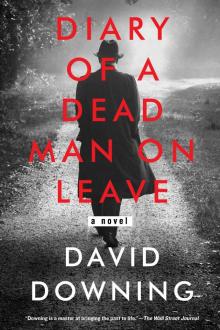 Diary of a Dead Man on Leave
Diary of a Dead Man on Leave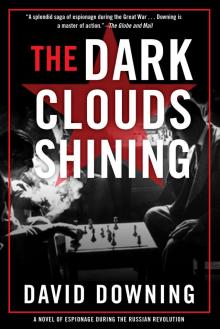 The Dark Clouds Shining
The Dark Clouds Shining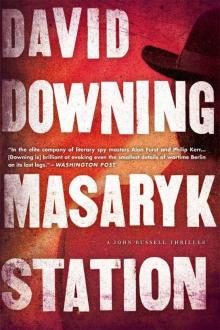 Masaryk Station (John Russell)
Masaryk Station (John Russell)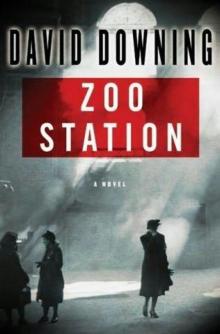 Zoo Stationee
Zoo Stationee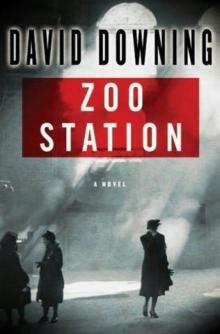 Zoo Station jr-1
Zoo Station jr-1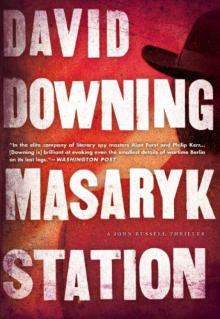 Masaryk Station
Masaryk Station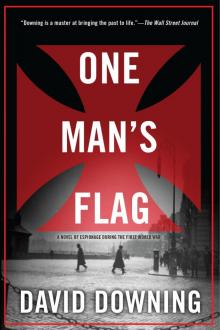 One Man's Flag
One Man's Flag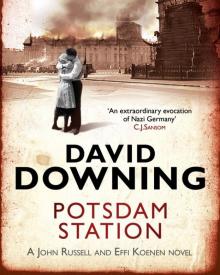 Potsdam Station jr-4
Potsdam Station jr-4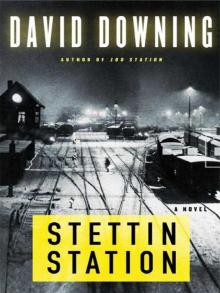 Stattin Station jr-3
Stattin Station jr-3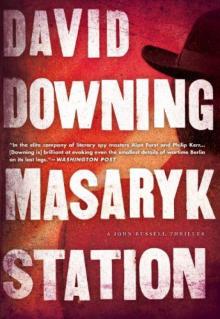 Masaryk Station jr-6
Masaryk Station jr-6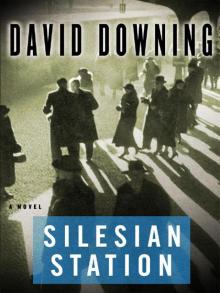 Silesian Station (2008) jr-2
Silesian Station (2008) jr-2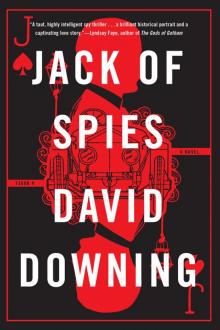 Jack of Spies
Jack of Spies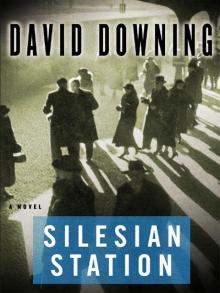 Silesian Station (2008)
Silesian Station (2008) The Moscow Option
The Moscow Option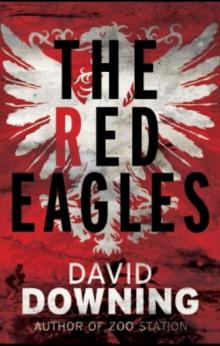 The Red Eagles
The Red Eagles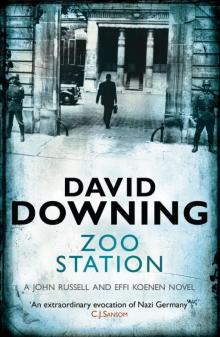 Zoo Station
Zoo Station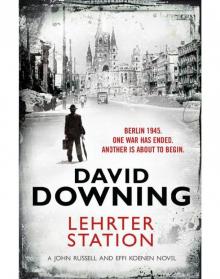 Lehrter Station
Lehrter Station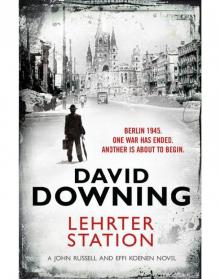 Lehrter Station jr-5
Lehrter Station jr-5